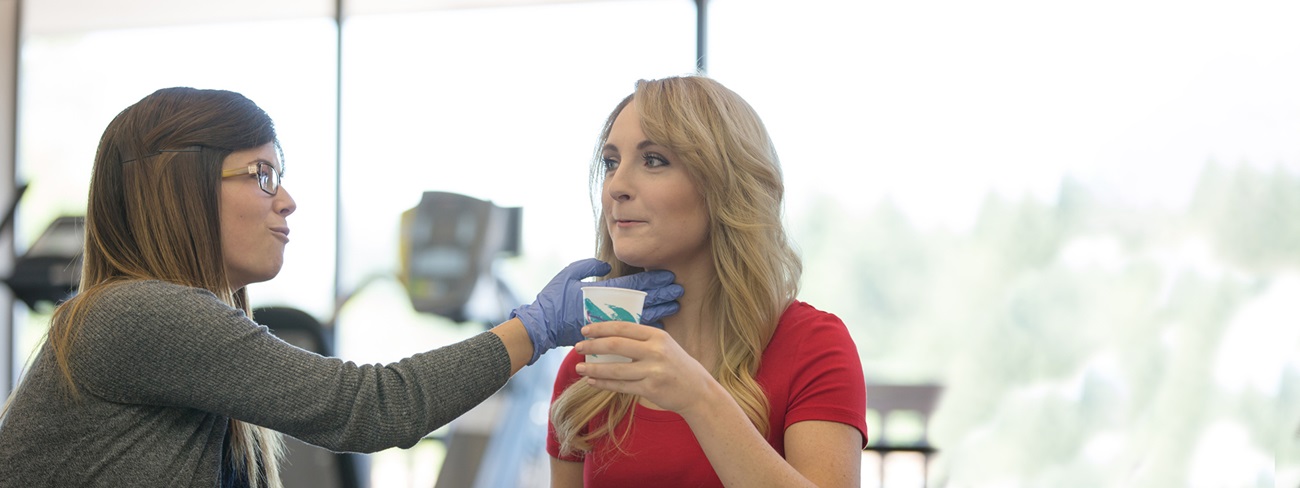


A bedside swallow exam, also known as a bedside swallow screen, is a test to see if you might have dysphagia . When you have dysphagia, you have trouble swallowing. This condition can sometimes lead to serious problems.
When you swallow, food passes through your mouth and into a part of your throat called the pharynx. From there, it travels through a long tube called the esophagus. It then enters your stomach. This movement is made possible by a series of actions from your muscles in these areas. If you have dysphagia, the muscles don’t work correctly. You may not be able to swallow normally.
When you breathe, air also enters your mouth and pharynx. From there, it travels to your lungs. Normally, a flap called the epiglottis blocks food particles and liquid from going into your lungs. If something does enter your lungs by accident, it’s called aspiration. You are much more likely to aspirate if you have dysphagia. Aspiration is a serious problem. It can lead to pneumonia and other complications.
During a bedside swallow exam, your healthcare provider will assess your risk for dysphagia and aspiration. The test can be done in your hospital room. It doesn’t need any special equipment. You will first be asked about your symptoms. You will also have a physical exam of the muscles used to swallow. You will then be tested on your ability to swallow different substances.
If you have dysphagia, you're at risk for aspiration. So dysphagia needs to be identified quickly. Many health problems can lead to it. These include:
You may need a bedside swallow exam if you are having any of these symptoms:
You may also need this exam if you have a medical condition that puts you at high risk for dysphagia. One example is if you have had a stroke. You may need the test even if you don’t have any symptoms of dysphagia. You may still be at risk for aspiration.
A bedside swallow exam is generally safe, but there is a slight risk that you might aspirate during the exam. This might lead to problems. But your speech-language pathologist (SLP) will try to prevent that.
The SLP typically starts the exam with the substances that are the easiest to swallow. They might stop at that part of the exam if you show signs of dysphagia and aspiration. If you have a very high risk of aspiration from dysphagia, you might not swallow anything as part of your exam.
Ask your healthcare provider if the exam presents any other risks for you. Follow-up tests to the exam may have risks, too.
You don’t need to do much to prepare for a bedside swallow exam. Follow any directions you are given for not eating or drinking anything beforehand. You may also want to make a list of your swallowing problems ahead of time. Then you can remember to share them with your SLP.
An SLP or a qualified clinician most often does the bedside swallow exam. The SLP checks for signs of dysphagia and aspiration throughout the exam.
First, your SLP may ask you questions about the following:
If possible, the SLP may also talk with your family members. The SLP may ask them about what foods you find hard to swallow and what foods you tend to stay away from.
During the exam, the SLP will carefully evaluate your teeth, lips, jaws, tongue, cheeks, and soft palate. You may need to do certain movements, like smacking your lips together or sticking out your jaw. You may also need to make certain sounds, cough, or clear your throat. The SLP may check your reflexes for gagging and coughing.
You will likely be asked to swallow a series of substances. They may range from water, thicker liquids, pureed foods, soft foods, and even regular foods. The SLP will note if you have problems chewing, swallowing, or breathing. They will also check if your voice sounds “wet.” That can be a sign of aspiration.
Many people need to stay in the hospital after their bedside swallow exam. They often need treatment for other health problems. If you have the exam while visiting your healthcare provider, you will likely be able to go home right after it. You will often find out about the results right away. If you don’t have any problems with swallowing, you may be able to eat normally again.
You may need follow-up tests if your healthcare team is still worried that you might have dysphagia. These tests can help identify dysphagia, even if you don’t have any symptoms. Sometimes they can also help pinpoint the source of a swallowing problem. These tests may include:
You may need treatment if the bedside swallow exam or other tests show that you have dysphagia. In some cases, your healthcare team may be able to address what is causing your dysphagia. Surgery is one possible treatment.
Whatever the cause of your dysphagia, you will need to take care to prevent aspiration. You may need to modify your diet. For instance, you may need to drink only liquids of a certain consistency, or drink no liquids at all. Let your healthcare team know if you have special foods that must be included in any dietary plan. You may also need to modify your position while you eat. You may learn special mouth exercises and methods to help you swallow. If your swallowing is very poor, you may need to use a feeding tube for a short time to prevent dehydration and malnutrition.
How long it takes you to recover from dysphagia depends on its severity and cause. It’s important for you to work closely with your healthcare team for the best treatment. If you're moving to another facility or going home, follow your healthcare provider’s guidelines closely and keep all follow-up appointments. They can help reduce your chance of aspiration and other health problems. Only make changes to your diet after talking with your healthcare provider.
Before you agree to the test or procedure make sure you know:

The Johns Hopkins Swallowing Center offers specialized swallowing evaluation, diagnosis and treatment for patients with swallowing disorders. Our multi-specialty team includes laryngologists, speech-language pathologists and other specialists, who work together to provide you with personalized and compassionate care.